Listed status bid for England's lost memorials
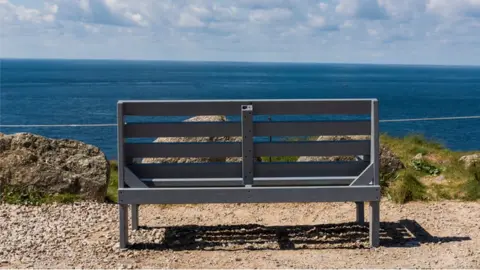 Getty Images
Getty ImagesHundreds of forgotten, secret and little-known memorials across England have been nominated for listed status by members of the public.
"Heroic", "quirky", "sad", "inspirational" and "challenging" are just some of the descriptions given to the suggested shrines and tributes commemorating those who have been loved, left, lost and ultimately rediscovered.
An exhibition will showcase some of the memorials selected by Historic England, as part of its Immortalised project.
The 'outcast dead'
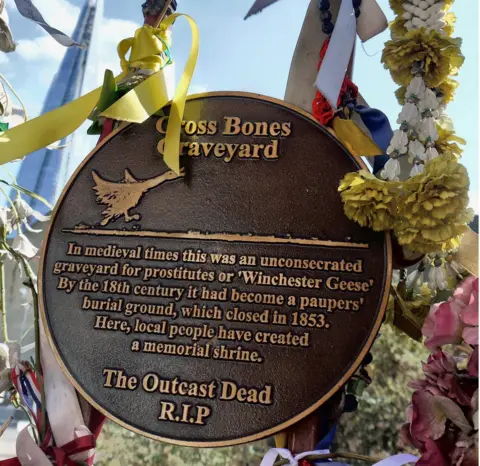 Historic England
Historic EnglandThere is a long-held belief that a patch of wild ground in Southwark was once a paupers' burial ground and, before that, the final resting place for medieval sex workers who were known as the "Winchester Geese" and denied burial in consecrated ground.
By the time Cross Bones Graveyard closed in 1853, it held the mortal remains of an estimated 15,000 people.
The site was largely forgotten until the 1990s when the extension of the Jubilee Line led to excavation of the area, revealing bones.
It is now a wild garden shrine to "the outcast dead" with photographs, ribbons, flowers, poems attached to the fence - and the association with dead sex workers has been revived.
Other London memorials nominated include a milepost near Harefield Marina in memory of Eily "Kit" Gayford who began a training scheme for women to work as boat crews on the canals, to help combat a shortage during World War Two; and a bench in Bostall Woods, the site of a marriage proposal in 1957.
The 13-year-old shot dead by police
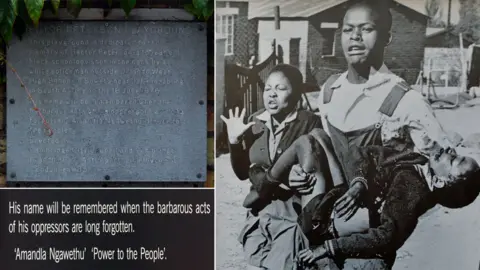 Historic England/Getty
Historic England/GettyThe Hector Pieterson Playground in Cambridge commemorates a 13-year-old school boy killed in the Soweto Uprising in South Africa in 1976.
The plaque was put up in June 1985 by the city council and the Cambridge branch of the Anti-Apartheid Movement.
It says: "This playground is dedicated to the memory of Hector Pieterson, a 13-year-old black schoolboy shot in the back by a white policeman outside Orlando West High School in Soweto near Johannesburg in South Africa on the 16th June 1976.
"His name will be remembered when the barbarous acts of his oppressors are long forgotten.
"'Amandla Ngwethu' 'Power to the People'".
Other nominations in the east of England include a stained glass window at All Saints Church in Cambridge and the sign at Swaffham village in Norfolk.

You might also be interested in
The lost Beatle
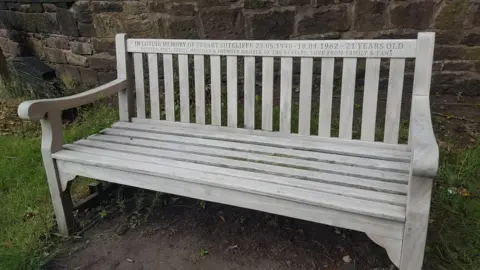 Historic England
Historic EnglandA bench in a small graveyard at Huyton Cemetery, Merseyside, commemorates Stuart Sutcliffe, the original bassist for the Beatles.
Sutcliffe had left the group to concentrate on studying art when he died in Germany aged 21 in 1962. He had a ruptured aneurysm and died in the ambulance on his way to hospital in Hamburg.
Other suggestions in the North West include a plaque to suffragette Annie Kenney in Oldham and a statue of the "cracker packers" - workers at the former Carr's biscuit factory in Caldewgate, Cumberland.
A Watford wall
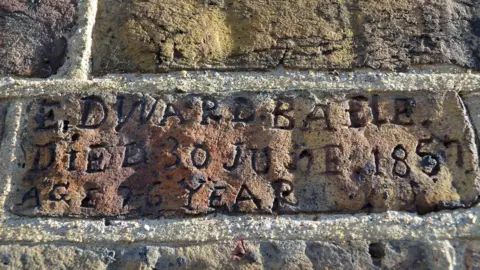 Historic England
Historic EnglandEtched bricks on the walls of the former male courtyard of the Watford workhouse commemorate some of the inmates who died there.
Their names are shown, and sometimes the dates when they died, and are probably the only grave markers they have.
The workhouse, built in the 1830s, could house up to 100 inmates. Though it was often a last resort, the men were there of their own free will. People usually ended up in the workhouse if they were too poor, old or ill to support themselves. The mentally ill and people with learning difficulties were often also accommodated in workhouses.
The building is now part of Watford General Hospital on Vicarage Road.
Other nominations in the South East include the black history mural at Reading Central Club and a memorial stone to a Edward Lewis Miller, who fell off the cliffs in 1846 at Afton Down on the Isle of Wight.
The woman who sneaked on board
 Historic England
Historic EnglandDorothy "Dolly" Peel was a fishwife and smuggler who protected local sailors from the press gangs. She is commemorated by a statue in the centre of South Shields.
During the Napoleonic Wars her husband and son were press-ganged to serve in the Royal Navy, and so Dolly sneaked onboard as well. She was discovered but was allowed to stay to nurse ill and wounded sailors.
The incident made her into something of a local heroine.
The statue was commissioned in the 1980s by a descendant and was intended as a tribute to the strength of local working women.
Others in the North East include a bronze casting of a football boot imprint at the site of the former Ayresome Park stadium, Middlesbrough; and a group of bronzes representing the Jarrow Crusaders, outside the town's Morrisons supermarket in County Durham.
Xylophone Man
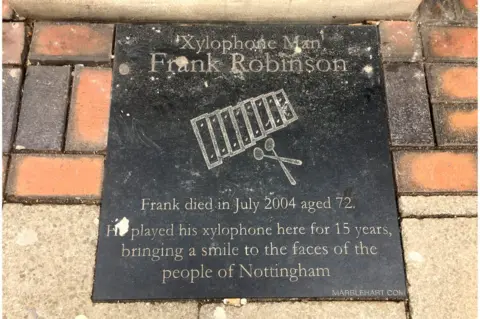 Historic England
Historic EnglandAn engraved plaque commemorates Frank Robinson, also known as Xylophone Man, who for years (despite his nickname) played his limited repertoire on a children's glockenspiel in Nottingham city centre.
The tile was paid for by public donations after Frank died in 2004 and reads: "He played his xylophone here for 15 years, bringing a smile to the faces of the people of Nottingham".
Other memorials in the East Midlands include a small pillar in East Langton, Leicestershire, marking the burial place of Lottery, the first winner of the Grand National, and a memorial cross to a Dr Timothy Ryan in the colliery village of Langold, Nottinghamshire, which was erected in 1959 by "grateful patients and friends".
Saviour of the sea
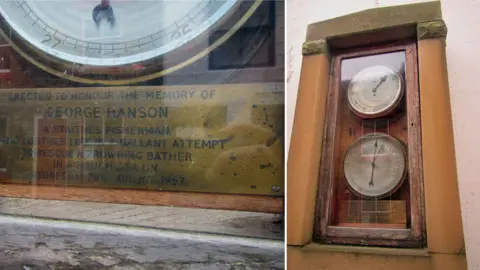 Historic England
Historic EnglandA memorial to George Hanson, in Staithes near Scarborough, takes the form of a clock and a barometer set into a stone frame.
Mr Hanson was a fisherman and the head launcher of the Runswick lifeboat. He plunged into the sea from the shore fully dressed one evening to save a schoolboy who was swimming in the harbour.
He returned to try and help the boy's teacher who was struggling in the water, but both men died.
The inscription reads: "He lost his life in a gallant attempt to rescue a drowning bather in a rough sea on Wednesday 28 August 1957".
Others nominated in Yorkshire include the gravestone of Ernest Stuart - who made the first stainless steel blade - at All Saints Church in Ecclesall, Sheffield, and Bridle Bridge in Girsby.
The knife angel
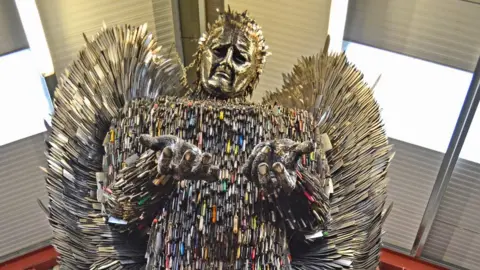 Historic England
Historic EnglandThe angel sculpture at the British Ironwork Centre in Oswestry, Shropshire is made out of knives handed in anonymously as part of weapons amnesties across the country.
It remembers knife crime victims and those who lost their lives to violence and aggression.
Other nominations from the West Midlands include a memorial stone to a young African chief, in Nuneaton, Warwickshire, and a statue of footballer Duncan Edwards in Dudley town centre.
Men of steel
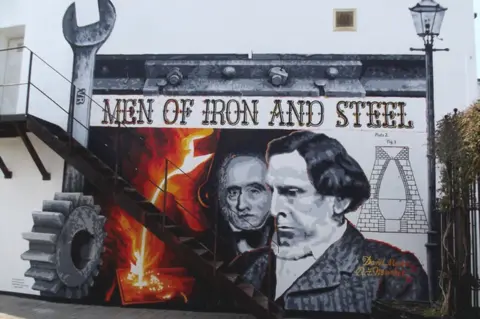 Historic England
Historic EnglandA 20ft (6m) mural in the town of Coleford, Gloucestershire, commemorates iron and steel innovators, father and son David and Robert Mushet.
In 1857, Robert Mushet was the first to make durable rails of steel rather than cast iron, providing the basis for the development of train transportation throughout the world.
An honourable mention must go to a plaque dedicated to a son killed by an icicle at Bampton Church in Devon.
Dated 1776, the inscription reads: "Bless my i.i.i.i.i.i. Here he lies in a sad pickle, killed by icicle".
Other suggestions in the South West include a memorial to Edward Spender at Tregonhawke near Rame Head in south-east Cornwall, who drowned in 1878 alongside his sons Reginald and Sydney whilst attempting to save them.

New and upgraded listings
The Memorial to Heroic Self-Sacrifice in Postman's Park, central London, has been upgraded to Grade II. There are 54 plaques commemorating "heroism in everyday life".
The following have been listed at Grade II:
The Preston Abstinence Memorial in Lancashire. Erected in 1859, it commemorates the success of the teetotal movement against alcohol consumption.
A gravestone at St Margaret's church, Staffordshire, to Sarah Smith who was poisoned in 1763, aged 21. The enigmatic inscription hints at the identity of her murderer.
The Free Czechoslovak Army (FCA) Memorial Fountain. It commemorates the army's actions in World War Two, in particular Operation Anthropoid, when seven servicemen from the FCA assassinated SS Obergruppenfuhrer Reynhard Heydrich.
Mary Carpenter's gravestone, Arnos Vale cemetery. She founded a ragged school, bringing education to poor children and young offenders in Bristol.
A memorial to Charlotte Dymond at Roughtor on Bodmin Moor, Cornwall. She was a servant girl murdered in 1844 by Matthew Weekes, a servant in the same household. About 20,000 people went to Bodmin jail to witness his hanging.
